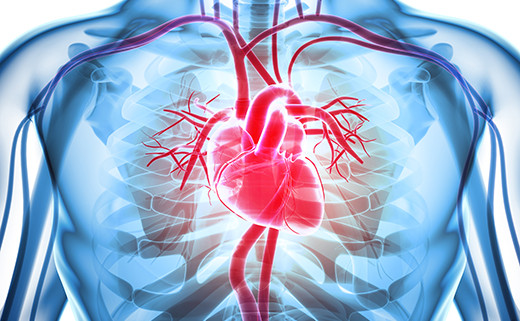Definisi
Jantung merupakan salah satu organ yang memiliki peran penting dalam sistem peredaran darah manusia. Jantung terdiri atas 4 ruang, yaitu serambi kanan dan serambi kiri, bilik kanan dan bilik kiri. Bilik jantung merupakan ruangan pompa utama pada jantung yang memiliki dinding otot yang lebih tebal dibandingkan serambi. Antar ruang tersebut dibatasi oleh katup-katup jantung. Katup tersebut akan mencegah darah kembali ke ruang sebelumnya.
Gagal jantung terjadi ketika otot jantung tidak dapat memompa darah sebagaimana mestinya. Ketika hal ini terjadi, darah akan menumpuk dan dapat kembali ke paru. Kondisi ini disebut juga sebagai gagal jantung kongestif. “Kongesti” memiliki arti penimbunan atau penumpukan.
Gagal jantung bukan berarti jantung sepenuhnya mengalami kegagalan dalam memompa darah ke seluruh tubuh. Jantung tetap dapat memompa darah ke seluruh tubuh tapi dengan kondisi yang lebih lemah dibandingkan dengan orang normal. Selain itu, kondisi ini juga memiliki kecenderungan terjadi pada lansia serta orang dengan riwayat gangguan jantung.
Penyebab
Gagal jantung sering terjadi setelah adanya kondisi lain yang menyebabkan kerusakan atau perlemahan jantung. Namun, pada beberapa kasus gagal jantung, kondisi ini dapat terjadi ketika dinding jantung menjadi terlalu kaku.
Pada gagal jantung, dinding pada bilik jantung menjadi lebih kaku dan tidak dapat terisi darah dengan baik ketika berdenyut. Kondisi ini menyebabkan jantung tidak dapat berfungsi sebagaimana mestinya. Sehingga, hal ini menyebabkan jantung tidak dapat memompa darah ke seluruh tubuh dengan maksimal. Seiring waktu berjalan, jantung tidak dapat memenuhi tugasnya untuk memompa darah ke seluruh tubuh.
Secara spesifik, terdapat beberapa kondisi yang dapat menyebabkan kerusakan dan kelemahan pada jantung Anda, di mana kondisi ini dapat menyebabkan terjadinya gagal jantung. Kondisi tersebut berupa:
- Penyakit jantung koroner dan serangan jantung. Penyakit jantung koroner merupakan salah satu penyakit jantung yang paling sering ditemui dan menjadi penyebab tersering terjadinya gagal jantung. Kondisi ini terjadi karena adanya penumpukan lemak di pembuluh darah koroner jantung yang kemudian menghambat aliran darah jantung. Akibatnya, penyumbatan ini dapat menyebabkan terjadinya serangan jantung.
- Tekanan darah tinggi. Jika tekanan darah Anda tinggi, jantung harus bekerja lebih keras untuk memompa darah ke seluruh tubuh. Seiring waktu berjalan, kondisi ini akan membuat otot jantung Anda menjadi kaku atau terlalu lemah untuk memompa darah.
- Kerusakan pada otot jantung. Kerusakan ini dapat disebabkan oleh infeksi, peradangan pada otot jantung, konsumsi alkohol dalam jumlah banyak dan efek toksik beberapa jenis obat.
- Kelainan jantung bawaan sejak lahir. Kondisi ini menyebabkan bilik atau serambi jantung serta katup jantung tidak terbentuk dengan baik. Hal ini menyebabkan jantung harus bekerja lebih keras agar dapat memompa darah ke seluruh tubuh. Kondisi ini dapat menyebabkan terjadinya gagal jantung.
- Penyakit lain. Beberapa penyakit jangka panjang seperti penyakit gula atau diabetes, HIV serta gangguan pada tiroid (hormon) dapat menyebabkan terjadinya gagal jantung.
Faktor Risiko
Terdapat beberapa faktor yang meningkatkan risiko seseorang mengalami gagal jantung. Faktor ini tidak jarang berkombinasi sehingga dapat meningkatkan risiko. Beberapa faktor risiko gagal jantung berupa:
- Penyakit jantung koroner. Penyakit ini menyebabkan sumbatan pada pembuluh darah jantung. Sumbatan tersebut kemudian menyebabkan gangguan suplai oksigen ke jantung. Hal ini akan menyebabkan melemahnya otot jantung.
- Serangan jantung. Serangan jantung merupakan bentuk penyakit jantung koroner yang terjadi secara tiba-tiba dan menyebabkan kerusakan pada otot jantung. Pada serangan jantung, otot jantung dapat mengalami kematian karena tidak mendapatkan suplai oksigen sehingga jantung tidak lagi dapat memompa darah dengan baik.
- Tekanan darah tinggi. Tekanan darah tinggi menyebabkan jantung harus bekerja keras.
- Kelainan jantung bawaan sejak lahir. Kelainan ini dapat berupa pembentukan serambi, bilik, atau katup jantung yang tidak sempurna. Ketidaksempurnaan struktur ini kemudian dapat meningkatkan risiko terjadinya gagal jantung.
- Diabetes meningkatkan risiko Anda mengalami tekanan darah tinggi dan penyakit jantung koroner. Lebih lanjut, hal ini dapat menyebabkan gagal jantung.
- Orang yang mengalami obesitas memiliki risiko lebih tinggi untuk mengalami gagal jantung.
- Jika Anda merokok, segera berhenti. Penggunaan rokok tembakau dapat meningkatkan risiko Anda terkena penyakit jantung dan mengalami gagal jantung.
- Konsumsi alkohol. Konsumsi alkohol berlebihan dapat membuat otot jantung menjadi lemah dan dapat menyebabkan gagal jantung
- Konsumsi jenis obat tertentu, seperti obat anti-peradangan, obat anestesi, obat darah tinggi, obat untuk mengatasi gangguan paru dan urin, serta obat untuk mengatasi infeksi.
Gejala
Terdapat tiga gejala utama yang terjadi pada gagal jantung, yaitu berupa:
- Sesak napas setelah beraktivitas atau saat beristirahat
- Merasa lelah hampir sepanjang hari dan merasa berolahraga sangat melelahkan
- Pembengkakan pada perut, kaki dan pergelangan kaki
Selain itu, juga terdapat gejala lain, yaitu:
- Jantung berdebar cepat dan tidak teratur
- Batuk kering
- Perut kembung, hilang napsu makan, dan mual
- Keinginan untuk buang air kecil ketika beristirahat pada malam hari
- Peningkatan berat badan
Gejala dapat muncul dengan cepat atau muncul secara bertahap selama beberapa minggu hingga berbulan-bulan. Gejala gagal jantung biasanya akan semakin memburuk seiring dengan berjalannya waktu. Semakin memburuk kondisi gagal jantung, gejala yang muncul akan semakin bervariatif.
Diagnosis
Anamnesis
Untuk menegakkan diagnosis gagal jantung, dokter Anda akan menanyakan beberapa hal yang berkaitan dengan keluhan yang Anda rasakan, riwayat penyakit yang pernah Anda alami sebelumnya, jenis obat-obatan yang Anda konsumsi, gaya hidup, dan hal lain yang berkaitan dengan gagal jantung. Dokter Anda juga akan melakukan pengecekan terhadap adanya faktor risiko serta keberadaan penyakit seperti tekanan darah tinggi, penyakit jantung koroner, dan diabetes.
Pemeriksaan Fisik
Pada pemeriksaan fisik, dokter akan mendengarkan paru Anda. Hal ini untuk mengetahui adanya bendungan cairan di dalam paru. Dokter juga akan mendengarkan suara jantung Anda dengan menggunakan stetoskop untuk mencari kemungkinan adanya kelainan suara yang mengarah ke gagal jantung. Dokter juga akan melakukan pemeriksaan pada pembuluh darah di leher Anda untuk mengetahui adanya penumpukan cairan pada perut dan kaki Anda.
Pemeriksaan Penunjang
Setelah melakukan pemeriksaan fisik, dokter akan melakukan pemeriksaan penunjang. Pemeriksaan yang dilakukan dapat berupa:
- Pemeriksaan darah. Pemeriksaan ini dilakukan untuk mengetahui adanya tanda penyakit yang dapat memengaruhi pada jantung Anda.
- Pemeriksaan X-ray atau rontgen pada dada. Pemeriksaan ini dilakukan untuk mengetahui kondisi paru dan jantung Anda.
- Pemeriksaan dengan CT scan. Pemeriksaan ini dilakukan untuk mengetahui gambaran atau pencitraan jantung. Selain menggunakan CT scan, dokter mungkin akan melakukan pemeriksaan dengan menggunakan MRI atau magnetic resonance imagining. Pemeriksaan dengan menggunakan MRI cenderung aman dan lebih bagus, tapi dengan harga yang lebih mahal dibanding CT scan.
- Pemeriksaan EKG (Elektrokardiogram). Pada saat pemeriksaan EKG, akan dilakukan pemasangan elektroda ke dada dan kedua kaki serta tangan Anda. Elektroda ini akan merekam sinyal pada jantung yang kemudian akan dinilai oleh dokter Anda.
- Tes stres. Pemeriksaan ini dilakukan untuk mengukur kesehatan jantung selama Anda sedang beraktivitas. Dokter akan meminta Anda untuk berjalan di atas treadmill dengan alat EKG menempel pada Anda.
- Coronary angiogram. Pemeriksaan ini dilakukan dengan cara memasukkan sebuah tabung tipis yang fleksibel ke dalam pembuluh darah untuk melihat kondisi pembuluh darah di jantung Anda.
Tata Laksana
Gagal jantung merupakan penyakit kronis yang membutuhkan pengobatan sepanjang hidup. Namun, dengan pengobatan yang tepat, gejala dan tanda gagal jantung yang muncul dapat membaik dan jantung dapat menjadi lebih kuat.
Dokter akan mengatasi penyebab yang mendasari terjadinya gagal jantung. Sebagai contoh, jika gagal jantung yang Anda alami disebabkan oleh kelainan jantung bawaan, maka dokter Anda akan melakukan operasi untuk memperbaiki kelainan jantung bawaan tersebut. Namun, bagi sebagian besar kasus, penderita gagal jantung akan membutuhkan penatalaksanaan dengan menggunakan obat. Pengobatan tersebut juga dapat diikuti dengan penggunaan alat yang membantu agar jantung dapat berdenyut dan memompa dengan baik.
Komplikasi
Terdapat beberapa komplikasi yang dapat terjadi pada gagal jantung. Komplikasi yang terjadi tergantung pada tingkat keparahan gagal jantung dan usia. Komplikasi yang dapat terjadi berupa:
- Kerusakan ginjal atau gagal ginjal. Kondisi ini terjadi karena gagal jantung menyebabkan penurunan jumlah aliran darah ke ginjal. Hal ini dapat menyebabkan terjadinya gagal ginjal jika tidak diobati dengan baik.
- Kerusakan pada hati. Gagal jantung dapat menyebabkan penumpukan cairan di dalam tubuh. Penumpukan ini akan memberikan banyak tekanan pada hati. Penumpukan cairan pada hati akan merusak hati sehingga akan membuat hati Anda menjadi kesulitan untuk bekerja dengan baik.
- Gangguan pada katup jantung. Gagal jantung menyebabkan dinding jantung menjadi lebih kaku. Hal ini menyebabkan jantung harus bekerja dengan keras agar dapat memompa darah ke seluruh tubuh. Sehingga dapat menyebabkan jantung mengalami pembesaran. Katup jantung membatasi ruang-ruang jantung agar darah tidak tercampur dari satu ruang dengan ruang lainnya dan agar darah mengalir ke arah yang benar. Ketika jantung mengalami pembesaran, hal ini menyebabkan terjadinya permasalahan pada katup jantung.
Pencegahan
Kunci utama untuk mencegah terjadiya gagal jantung adalah dengan mengubah gaya hidup menjadi lebih sehat dan mengonsumsi obat sesuai dengan anjuran dokter. Jika Anda merokok, maka segera berhenti merokok. Jika Anda memiliki tekanan darah tinggi dan diabetes, kontrol secara berkala dan patuhi anjuran dokter. Makan makanan yang sehat, jaga berat badan agar tetap normal, aktif secara fisik dan pelajari cara untuk memanajemen stres juga dapat dilakukan untuk mencegah terjadinya gagal jantung dikemudian hari.
Kapan Harus Ke Dokter?
Segera kunjungi dokter Anda jika Anda merasakan munculnya gejala gagal jantung yang menetap dan semakin memburuk.
Jika Anda ingin mengetahui informasi selengkapnya seputar penyakit, cek di sini ya!
- dr Nadia Opmalina
NHS. Uk. (2021, 26 Oktober). Heart failure - NHS. Diakses pada 30 Maret 2022, dari https://www.nhs.uk/conditions/heart-failure/
Mayoclinic.org. (2021, 10 Desember). Heart failure - Diagnosis and treatment - Mayo Clinic. Diakses pada 30 Maret 2022, dari https://www.mayoclinic.org/diseases-conditions/heart-failure/diagnosis-treatment/drc-20373148
Clevelandclinic.org. (2022, 21 Januari). Heart Failure (Congestive Heart Failure): Symptoms & Treatment. Diakses pada 30 Maret 2022, dari https://my.clevelandclinic.org/health/diseases/17069-heart-failure-understanding-heart-failure
Mayoclinic.org. (2021, 10 Desember). Heart failure - Symptoms and causes - Mayo Clinic. Diakses pada 30 Maret 2022, dari https://www.mayoclinic.org/diseases-conditions/heart-failure/symptoms-causes/syc-20373142












